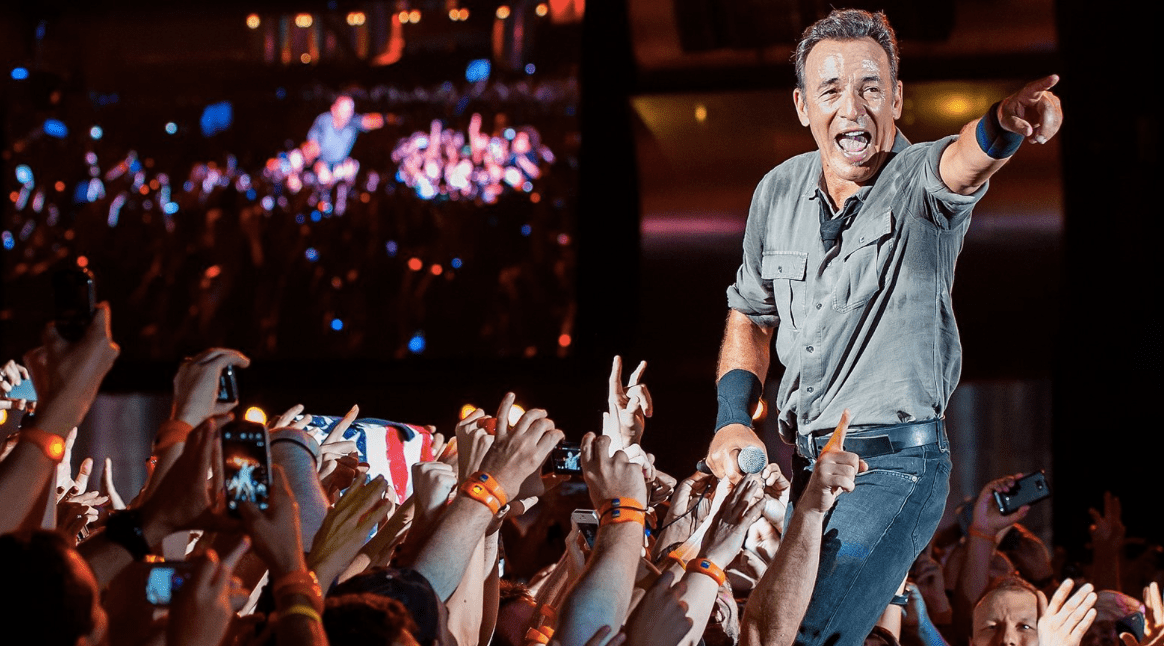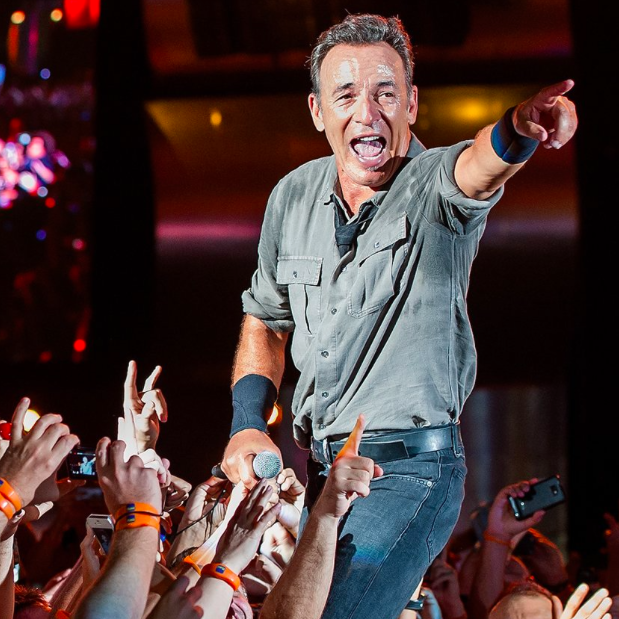
Tonight I will drive to Philadelphia and see Bruce Springsteen for the XX time.
Those Xs aren’t a typo. I have seen Bruce Springsteen in concert more than 10 times — more than 20, maybe more than 30 — but fewer than XXX, having started too late — in his career, in my life — for that. I like to sit next to the XXX people at the shows because they are enraptured, and I wonder what happened in their lives to bind them so closely to this man and this experience. I wait for the song that makes them close their eyes, to block out the crowd and live alone, in that moment, with that song. Who did they love and now can no longer love (“Brilliant Disguise”)? What lucky break did they miss (“Atlantic City”)? What became of their jobs (“Jack of All Trades”)? What became of their homes (“My City of Ruins”)? Who have they lost (“Terry’s Song,” all of them)?
It is key to the Bruce Springsteen experience that every one of those questions, not only the final one, wants to end itself with the word “lost.”
I saw him in Toronto on a 9/10 very shortly after 9/11, and I said to myself: I may be among Canadians, but at least I am home. I saw him at Madison Square Garden in 2012 and ran up the escalators, with the rest of the latecomers, as the opening blast of joy and desire and anger that is “Badlands” rang down the space. I leaned out the window of my South African boyfriend’s London apartment to hear what we could when he played Hyde Park, when the exchange rate had strawberries at $12 the basket and put the tickets out of reach for an underemployed design writer in the middle of the recession. We saw him together when he headlined Glastonbury, and we saw him, apart, three years later, when he returned to Hyde Park. I have taught the South African something, I told myself, having come to Europe for that show, and one in Vienna, if not against my doctor’s advice then with his reluctant acquiescence: I was old enough then to discover what it is like, exactly, to go into a medical office and come out with an unexpectedly keen sense of my own mortality. After the show — which I had not liked, with its muddy, querulous, snarling crowd — I took a bath, counted my heartbeats, and waited to die. If it’s going to be now, I thought, it might as well be after a Bruce Springsteen show.
Tonight, I will be far from the only person in the crowd to trace my past relationships, and the inconstant perfection of my physical form, by way of Bruce Springsteen concerts.
I was in elementary school when Born in the USA came out, old enough to understand the title but too young to understand the lyrics. My foremost memory of myself in middle school is standing on my parents’ lawn in the rain, listening to the Cure on my Walkman. In high school, I saw Violent Femmes and Indigo Girls; in college, I went to the Beacon Theatre and waited on the sidewalk until a man gave me his spare ticket to Tori Amos and I gave him half of a bagel in return.
I didn’t listen to Bruce Springsteen until after college. I was working at a website in Manhattan when my friend Bill — the co-worker who knew all the best songs decades after they charted, all the best movies weeks before they come out — told me to listen to “The River.” I had actually never heard it, despite nearly two decades growing up in New Jersey, despite the fact that my own high school sits on the Highway 31 of “Reason to Believe.” That was it; there was nothing more; I fell in love with the music the way I would fall in love with the South African: without reservation.
My friends don’t get it (except the ones who do, and they totally, totally do): Why are you going again and again? There is not much cool about going to a Bruce Springsteen show (except in the best sense of cool, in the sense that the essence of cool is to love hugely, unabashedly, without apology). It does not, though, broadcast a refined sense of style or aesthetics; I am not positioning myself in a tribe that is beyond cynicism or reproach.
It is not dangerous, in the way cool has been (Lou Reed, Jimi Hendrix, Sid Vicious). One expression of cool is of defiant superiority: We may be poor, we may hurt, but we are young and brave and alive. Cool wins, and in style. After four decades together, the tribe of Bruce Springsteen does not win so much as it endures. It creaks. It is not whole, as anyone knows who has seen the video tribute, shown regularly now in concert, to saxophonist Clarence Clemons (who died in 2011, who kissed Bruce on stage, unabashedly, without reservation) and organist Danny Federici (who died in 2008, who went to that same high school on Highway 31). We lose: strength, beauty, money, love.
That admission, though, is a saving grace in the most literal sense. Though socially conscious music of all forms, of all times, speaks to anger, injustice and loss, we are without question in a cultural moment that privileges illusion: of wealth, of youth, of beauty, the whole slithering, contoured mask of perfection that has become our aesthetic ideal. Our culture celebrates the winners (however predatory) and dismisses the losers (however innocent), and we turn ourselves into monsters so that we can assure our place among the victors. Despite Springsteen’s progressive politics, Donald Trump bumper stickers will challenge Hillary Clinton’s for popularity in the parking lot of Citizens Bank Park tonight. The rage that Trump has channeled so assiduously runs like a needle through decades of Springsteen’s songs. The blame is placed elsewhere, but the anger is the same: just wait for the cheers from the crowd that routinely follow these (truncated) lyrics, from “Jack of All Trades,” written, not coincidentally, in 2009:
The banker man grows fat, the working man grows thin….
If I had me a gun, I’d find the bastards and shoot ’em on sight.
Donald Trump and Bruce Springsteen give voice to these same concerns, and with the same level of perceived authenticity. One promises that everything lost can be won back. One doesn’t. But what Bruce Springsteen gives us is better.
He gives us redemption. He acknowledges that our losses are real. We are not the same as we once were; we are not unblemished. But he also promises that whatever has been lost — whatever will be lost in the years still to come! — is with us, now and always, that true love is mutable but neverending, that it persists, that we persist, and each concert is a stand against those losses, and builds anew that bulwark.
Why do you go again and again? my friends ask.
“Because I don’t go to church anymore,” I say.
